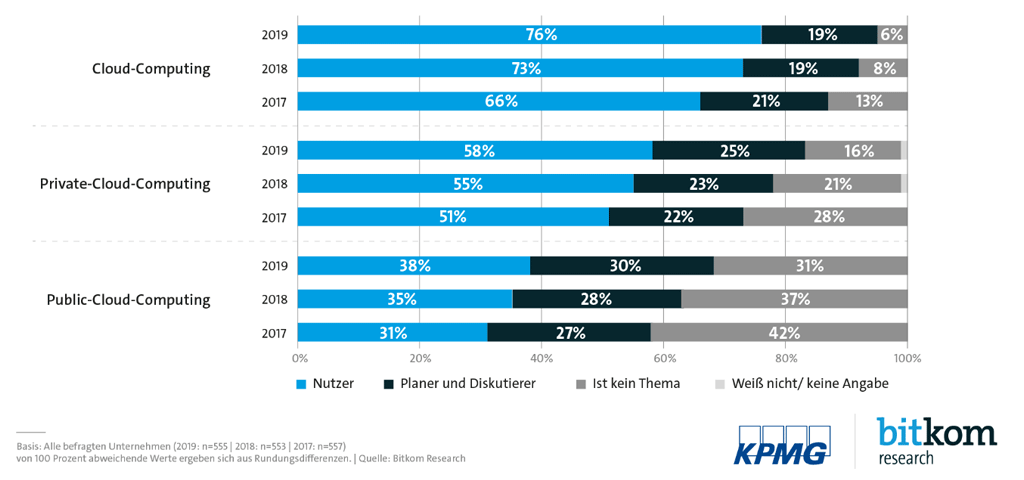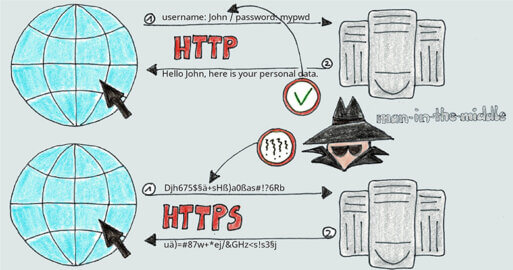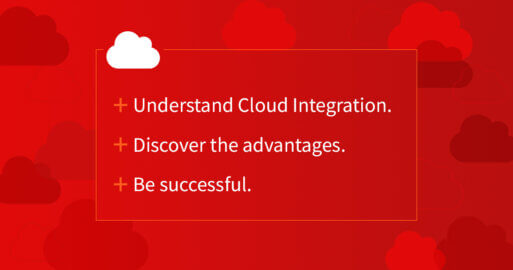Cloud solutions for incoming mail and invoices – find the right cloud with TCG and SEEBURGER

The transition to cloud computing – or perhaps not – is keeping more and more companies busy. A whole range of questions arise during the decision-making process:
- How do I deal with the issue of data protection?
- What needs to be encrypted?
- As a customer, which IT resources and know-how do I need to have at hand?
- Where is my data actually stored when it is in the cloud?
- What exactly do the public or private cloud hold in store for me?
- Which differences are crucial for me?
- How is the integration with my existing IT landscape carried out?
Sara Mazzorana our guest author from TCG Process GmbH looked at the latest studies on this topic as well as the solutions from TCG and SEEBURGER.
Cloud computing offers great potential for cost savings and for modernizing existing processes. According to the results of a study conducted by KPMG in cooperation with bitkom[1], acceptance of cloud computing has increased significantly in recent years. In 2019, 76% of companies will use the cloud, which is 10% more than in 2017.
Even though public cloud solutions are currently still less accepted by companies than private cloud solutions, this acceptance is growing steadily. After all, the overall share of companies using the public cloud in 2019 will be greater than that for which the cloud is not yet an issue.
Three of four companies use Cloud Computing
In how far is your company using Cloud Computing or is planning or discussing its use?

According to KPMG’s Cloud Monitor 2020, the most important criteria for selecting a cloud provider are compliance with the GDPR, IT security, especially with regard to Service Level Agreements (SLA), followed by special requirements such as high availability and integration capability of the solutions.
As a provider of automation solutions, TCG no longer offers implementation only on-premises. TCG offers solutions in both the private and public cloud.
By and large, customers deal with three basic scenarios when deciding on a new software solution:
Scenario 1: Public Cloud – Automated Solutions on a Standardized Platform
The expectations in software regarding usability and stability have increased. It has to be as simple as electricity from the socket. Complex infrastructure and technology runs in the background. In this scenario, we are talking about using software as a service – SaaS – in a public cloud environment. This naturally has advantages.
Customers no longer have to worry about the administration and operation of hardware and software. The cloud provider, together with the software manufacturer such as TCG and SEEBURGER, will handle this for them.
The software is standardized and therefore very stable, updates and hotfixes are installed automatically, customers always use the latest version of the software. Customers only pay for the volume they actually use. This allows flexible pricing models based on the subscription model. This scenario is suitable for standard processes such as incoming invoice processing. Here TCG, together with its long-term partner SEEBURGER, offers an Invoice Portal Service in the cloud. Other standard processes for processing orders, order confirmations or delivery bills will be offered in the future via cloud services.
As the name suggests, the public cloud is not something that customers use alone. In other words, no special requests will be accepted – they will use the system together with many other customers, separated by client and in compliance with GDPR. This makes the system extremely robust and attractively priced, but individual wishes cannot be implemented. Integration with the customer’s IT systems is possible via available standard interfaces. For special solution requirements, it is therefore worth considering using the solution exclusively on a private cloud.
Scenario 2: Private Cloud – All The Advantages Of The Cloud While Taking Individual Requirements Into Account
The desire to reduce the complexity and size of one’s own IT landscape is omnipresent. At the same time, system landscapes, especially those of large organizations, are highly diverse and more complex than ever before. In the private cloud, both aspects can be taken into account.
The organization enjoys the cost benefits of outsourcing and individual control as with an in-house system, even though location and IT administration are not the same. The customer hands over the responsibility for the operation and infrastructure. As in the public cloud, the cloud providers and, if desired, the software providers take over. Typically, an SaaS, PraaS (Process as a Service) or iPaaS model is used here, depending on how much of the operational responsibility is to be handed over: It can be IT infrastructure only, or also the operational monitoring of the software and the individual process applications (process apps). A further advantage over the public cloud: When connecting to the customer’s existing system landscape, customer-specific interface requirements can be addressed much more individually.
Installation in a private cloud is particularly suitable when it comes to complex incoming mail solutions. The solution can be connected to many different incoming channels and also to the subsequent specialist systems. Thanks to the cloud environment, the system is scalable and can be expanded to handle additional document volumes and processes. Customer-specific SLAs must of course be taken into account. This is particularly important when choosing a cloud provider, as are the issues of IT security and ensuring data protection.
The customer uses their cloud environment exclusively. The higher costs for infrastructure and operational support compared to the public cloud are profitable for large organizations with a certain document volume and the correspondingly complex process structures.
Scenario 3: On-Premises – Continue to have everything in your own hands
Sometimes internal processes or data protection regulations leave no other option: operational administration must remain in the company’s own data center. The system is 100% in the hands of the customer, completely independent of third-party providers. The personal data remains within the organization. The advantages of a platform solution like TCG’s also allow flexible expansion of on-premises systems, for example, if new document types such as delivery bills, orders or order confirmations are to be processed on the same platform. Web-based clients for administration and users allow on-premises users convenient browser-based access from any authorized workstation, including home offices, or from connected workstations at lower cost locations. TCG and SEEBURGER also offer joint solutions in this area.
Know-how and IT resources of the customer are required for the implementation of the software. Building up and keeping this up to date is increasingly costly. At the same time, specialists are becoming increasingly rare and the operation of one’s own data centers increasingly expensive. The cloud can solve all these problems. However, if the chosen path does not lead to the cloud, software manufacturers such as TCG also offer support, for example by taking over operational support.
Public, Private or On-Premises – Your Data Is Safe With TCG and SEEBURGER
Although the data resides with the customer, data protection on-premises is just as much an issue as it is in the cloud. The biggest customer concerns about ensuring data protection relate to the public cloud environment. According to KPMG, more and more companies are entrusting critical corporate and customer information to a public cloud solution. Today, one in two public cloud users also store personal data in the cloud.
Whatever IT environment or combination of environments you choose for your incoming mail and incoming invoice processing – TCG, together with SEEBURGER, is available as your contact to select and implement the right scenario.
[1] Cloud-Monitor 2020 by Bitkom Research on behalf of KPMG AG based on a telephone survey among 555 German companies of all industries with more than 20 employees. Interviewees were General Managers, IT-Managers, CTOs and CIOs. The survey is representative for the overall German economy.
Thank you for your message
We appreciate your interest in SEEBURGER
Get in contact with us:
Please enter details about your project in the message section so we can direct your inquiry to the right consultant.
Written by: Sara Mazzorana
Sara Mazzorana is Marketing Manager at TCG Process GmbH. After completing her Bachelor's degree in Business Administration, Sara Mazzorana specialized further with a MA in "Entrepreneurship and Innovation" at the University of Bolzano. Sara Mazzorana joined TCG in Baienfurt near Lake Constance in 2018.





